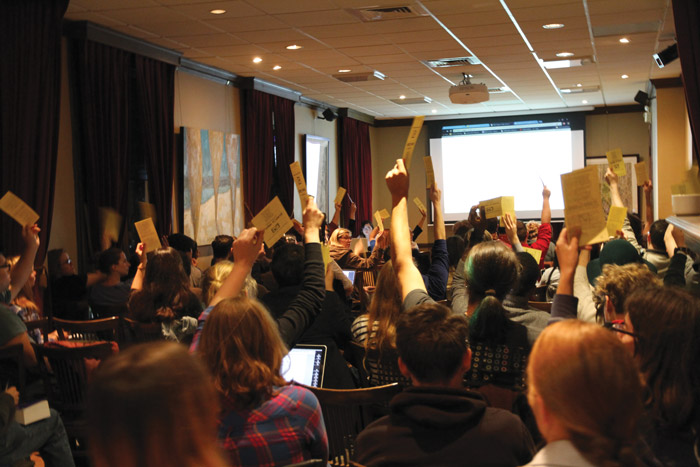Last Wednesday, the Post-Graduate Students’ Society (PGSS) Council heard a presentation regarding a motion that would endorse the Association of Graduate Students Employed at McGill’s (AGSEM) drive to increase the scope of teaching support workers that they represented. In addition, Council passed motions concerning the Post-Graduate Student Life Reform Package, the creation of a PGSS Sustainability Committee, and the adoption of the Universal Public Transit Pass for students.
AGSEM union drive endorsement
Justin Irwin, president of AGSEM, presented a plan to expand the membership of AGSEM to include teaching support workers such as tutors, note-takers, graders, course assistants, and undergraduate teaching assistants. PGSS passed a motion to officially endorse the drive.
“[Teaching support workers] do very similar work to graduate student TAs, and often identical work, but make very different sums of money,” Irwin said. “A graduate student working as a teaching assistant makes $26.85 per hour including vacation pay, whereas an undergraduate or someone working as a grader or marker is paid basically depending on what the hiring end of the department they’re working for determines is appropriate.”
Irwin pointed out the lack of standardized pay for teaching support workers and undergraduate teaching assistants, and noted that these workers have no protection from workplace issues.
“If any issues arise, whether it’s harassment in the workplace—which hopefully doesn’t happen all that often, but is still a problem sometimes—or any issues of getting paid, these people basically have to speak for themselves and represent themselves,” Irwin said. “They don’t have the protection of the union.”
Creation of the PGSS Sustainability Committee
Post-graduate psychology student Regine Debrosse and PGSS Environment Commissioner Amanda Winegardner presented a motion to create a PGSS Sustainability Committee, which was passed by Council. The motion proposed an amendment to the Student Activities Manual, allowing for the creation of a committee that operated in line with McGill’s existing approach to sustainability.
“This is an important motion because, with the termination […] of the sustainability coordinator position, we don’t have anyone who’s responsible for these types of issues,” Winegardner said. “So I think this is a good step.”
Universal public transit pass
External Affairs Officer of the PGSS Julien Ouellet presented the Executive Committee’s motion to support the creation of a Universal Public Transit Pass for McGill students. The motion was passed by Council. It would combine students’ I.D. card, Opus Card, and student rebate card into a single pass.
“It’s basically a Montreal student Mastercard,” Ouellet said. “It will fuse all the cards you need into a single card.”
The card will be brought forward to Je Vois Montreal, a forum that decides on new products designed to revitalize the city. Ouellet hopes that the project will help with another larger goal to extend student fares to graduate students over 25.
“Students who are 25 years old or older cannot benefit from the reduced student fare in Montreal,” Ouellet said.” What we want to do is to use that opportunity to push this agenda through. It’s part of our work plan, and we’re really hoping it will be able to put a foot in the door for that particular project.”
PGSLF Reform Package
The Post-Graduate Student Life Fund (PGSLF) funds post-graduate student associations out of a fee levy paid by all PGSS members. PGSS Financial Affairs Officer Danielle Meadows discussed amendments to the fund during Council.
“The idea behind changing the PGSLF system is to really put [the fund] back in students’ hands, to take it out of our office’s hands and really let the students be the drivers of their own destiny,” said Meadows. “It’s their money—they can use it and do what they’d like.”
The main change made to the PGSLF concerns post-doctorate fellows, whose student association—the the Association of Post-Doctorate Fellows (APF)—currently receives no money from post-doctorate student fees. Instead, the funds go towards the student’s corresponding program student department. The proposed amendment would allocate 75 per cent of post-doctorate student fees to student departments and 25 per cent to the APF.
“Post-doc fellows are typically counted for [in] both [the] APF and their [own] department,” Meadows said. “At the moment, they have no funding, and in previous years they’ve come to the [executives] and the Council directly requesting that we take money out of other areas of our budget and allocate it to them [….] But that’s not really fair and it’s not giving them a sustainable mechanism for having funding going forward.”
The 75/25 split was in part influenced by feedback from some of the larger graduate student associations. These associations often must give up greater amounts of their budget to APF .funding through the current funding process due to the higher numbers of post-doctoral fellows, and would therefore support an alternative source of funding for the APF.








